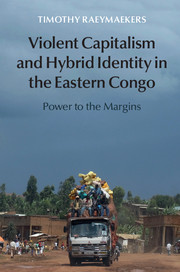 I am somewhat proud to announce the publication of my first single authored book with Cambridge University Press: Violent Capitalism and Hybrid Identity in the Eastern Congo: Power to the Margins.
I am somewhat proud to announce the publication of my first single authored book with Cambridge University Press: Violent Capitalism and Hybrid Identity in the Eastern Congo: Power to the Margins.The book discusses the radical transformation of eastern Congo’s political order in the context of apparent armed destruction and state weakness. Throughout the seven chapters, I trace back today’s violent rule patterns to a tumultuous history of extra-economic accumulation, armed rebellion and de facto public authority in the margins of regional power plays.
The book’s originality lies in its critically assessment of East Congo’s presumed collapse into “chaos”. Looking beyond the dominant paradigms, my main focus lies on cultural and economic uncertainty. Rather than curing the world’s ills – which, unfortunately, remains the dominant tendency in contemporary conflict analysis – I try to answer the difficult but important question what institutional changes result from strategies of daily risk management in an environment characterised by violent competition over the right to govern.
Pre-order forms can be found here

A first review has just come in by Foreign Affairs: http://www.foreignaffairs.com/articles/143634/timothy-raeymaekers/violent-capitalism-and-hybrid-identity-in-the-eastern-congo-powe
Another review of my book just came out in the Journal of Modern African Studies: http://journals.cambridge.org/action/displayAbstract?fromPage=online&aid=10321653&fulltextType=BR&fileId=S0022278X16000112
Kasper Hoffman writes ‘Raeymaekers’ book is much more than a case study of the Nande traders. Through the study of the Nande traders and their relationships with armed groups, state authorities, and religious authorities he shows why the current situation in the Congo cannot simply be understood as a “crisis” or a “complex emergency”, but must instead be understood as a gradual transformation of local society under the weight of the expansion of global capitalism and state encroachment towards a highly unequal society in which strategies of power and resistance are fatally tainted by violence and coercion.’